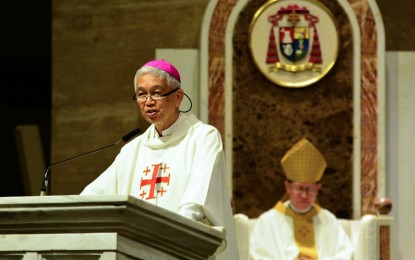News
Manila archdiocese sets rules for services once gov’t lifts ban

Apostolic Administrator of the archdiocese, Bishop Broderick Pabillo, said Thursday the protocol would be practiced to make sure religious activities do not contribute to the spread of the coronavirus disease 2019 (Covid-19). (File photo courtesy of CBCP News via PNA)
MANILA – The Archdiocese of Manila has prepared guidelines for religious services, including the holding of Masses, once the government allows the conduct of these activities.
Apostolic Administrator of the archdiocese, Bishop Broderick Pabillo, said Thursday the protocol would be practiced to make sure religious activities do not contribute to the spread of the coronavirus disease 2019 (Covid-19).
“These guidelines are given due to our extraordinary situation. They are therefore temporary in nature. Furthermore, the situation is so fluid that we foresee that there will be other guidelines that will follow when the situation changes or when there are other directives that will come from the government or the church hierarchy,” Pabillo said in a statement.
Among the protocols to be followed by the clergy and the faithful is the wearing of face masks. Marshals and ushers will be deployed to make sure that this rule is followed.
Face masks will also be sold in parish offices at a low price for those who do not have one.
“Still, no holding of hands at the Our Father and no handshakes at the giving of peace. A bow with a smiling face can already be a good sign of peace. Before communion, the priest shows the Sacred Host to the people and says, ‘The Body of Christ,’ and the people answer ‘Amen,'” he said, noting that as such, there will no longer be any conversation when the minister lays the host on the communicant’s hands during Communion.
Churchgoers will have their body temperature taken using a thermal body scanner, which will be standard equipment in all parishes.
People will be allowed to enter the church until all spaces, taking physical distancing into account, are occupied.
“The places to be occupied in the pews should be indicated to help people keep social/physical distancing. The people should strictly occupy only those places indicated,” Pabillo said.
Those who can no longer be accommodated inside the church may stay outside but must also observe proper distancing.
TV monitors and a clear sound system will be set up for the benefit of those who are outside and in parking spaces.
According to Pabillo, churches should mark the entrance and exits so that people coming in would not meet those who are leaving. Marshals will keep order at the entrances and exits.
Each entrance and exit should have a footbath and there should be hand sanitizers at the entrance, he said, adding that all holy water fonts should be emptied and covered so that they may not be used.
The number of servers in Masses will also be limited.
“Let there be only one or two altar boys serving in the Mass. If possible, the Mass servers should not be children. If they are below 18 years old, they should have the written permission of their parents. If the Mass servers are all children, let the extraordinary lay ministers be trained to serve also as Mass servers,” Pabillo said.
Instead of choirs, only one song leader and one instrumentalist will lead the people in singing.
“There can be less singing in the Mass. The ushers and marshals shall be going around the church to remind people of social distancing,” he said.
Notices in front of religious images should also be placed to remind people not to touch or wipe them. Short prayers can be posted in front of the images to help the people pray.
The archdiocese also discouraged churches from using air-conditioning units.
“For those churches which are air-conditioned, it would be better if the air-conditioning is not used during this time. It will not be so hot after all because there will not be any overcrowding. Explain to the people that open areas are better than closed spaces to ward off the virus,” Pabillo said.
Parish comfort rooms should be properly maintained and soaps should be available for proper hand washing.
There should be at least a half-hour gap between Masses to allow the church to be disinfected after each service, he said.
Churches are also encouraged to hold Masses on weekdays.
“Ask the people to come on the times when there are fewer people. Encourage the faithful to come on weekday Masses if they cannot come on Sundays,” Pabillo said. “The presence of difficulty, and in some cases impossibility, of fulfilling the Sunday obligation renders the obligation suspended during these extraordinary circumstances.”
Live streaming of Masses will continue for the benefit of those unable to participate in the community celebrations due to “sickness, old age, fear, and caution,” he said.
Mass gatherings, including religious services, remain prohibited under the enhanced and the general community quarantine.





















